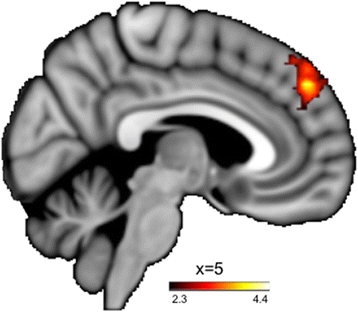If there is one thing that neuroscience and psychology agree upon, it is that the ventral striatum region of the brain is a central node in something called "the reward system". It is incontrovertible that across experiments involving rewards, the ventral striatum lights up both in anticipation of and in receipt of reward.
The ventral striatum - reward association has been so established with neuroscientists that they will strain to see it even when contrary evidence presents itself. In perhaps the most amusing and saddening example, researchers examined how borderline personality disorder (BPD) patients reacted to a provocation vs normal controls. All subjects were asked to write an essay about a time when somebody made them angry. The participants then received feedback that was harshly critical of their essays, with insulting evaluation points, culminating in the comment, “One of the worst essays I have EVER read!”, viewed for 10 seconds. Finally, participants were asked to ruminate about how angry they were at the criticism. During the feedback and rumination sessions, participants were scanned under fMRI. The study is here:

Note imaging of right 45 in the thumbnail
The findings can be summarized as follows:
- During feedback, BPD patients had higher activation than controls in right 45, which in our model is Heraclitus. Right 45 is most well-known for response inhibition and processing, but the name Heraclitus refers to seeking hidden meaning and solving riddles, which is perhaps the most interesting right 45 specialty. We may interpret this result as the BPD patient having to control themselves and trying to make sense of the harsh criticism while laying in an fMRI chamber.

- During rumination about the essay criticism, bilateral 9mdp were more activated in BPD patients. These often show up when thinking about how other people judge the self, when judging people not like ourselves, and self-criticism. They are named Zeus (right) and Hera (left), reflecting these areas' specialization in judgment of others and the self. BPD patients are certainly known for these behaviors. Interestingly, independent of BPD, activation of this region during emotional regulation tasks is associated with good emotional regulation in males, but poor emotional regulation in females. This is an intriguing interpretation of Jungian animus.
- Ruminating about the essay criticism revealed a relatively large right ventral striatum contrast in BPD patients versus controls. The right ventral striatum is Lucifer in our model, as an empirical neuroscience case can be made that there is no better locus of evil to be found in the brain. We always caveat this to say that a healthy ventral striatum is crucial to a healthy happy psyche, but when the ventral striatum goes awry, the psyche goes with it.
The researchers came to a rather startling conclusion, based on the notion that the ventral striatum activation means reward:
If provocation-focused rumination following interpersonal criticism is a rewarding experience [ed. for emphasis] for these women, that may explain why they do it despite the long-term negative consequences. It also may make it difficult for them to stop engaging in provocation-focused rumination or to be motivated to try to stop, even if they are aware of its detrimental effects. This reward-sensitization could also foster other addictive tendencies. Bidirectional cross-sensitization has been demonstrated between substances and naturally occurring rewards, such as food and sex [60,61,62], with sensitization to one stimuli increasing responses to the other due to common neural mechanisms [63]. Individuals with BPD demonstrate elevated rates of impulsive behaviors such as substance abuse, binge-eating, and risky sexual behavior [1]; early sensitization to provocation-focused rumination-related reward could contribute to these vulnerabilities.
Here we see researchers seriously proposing that borderline patients, in contrast to normal humans, actually enjoy ruminating about being told that their essays were horrible. This is because they cannot conceive of the ventral striatum activation any other way than as "reward".
I find this rather demeaning and condescending towards borderline personality patients. They are human beings like anyone else. One can only acquire this sort of idea when one sits in an ivory tower and spends little time with the subjects they are studying outside of survey questions and experimental setups. There is little reason to believe that BPD patients are unconsciously at the mercy of a miswiring doom loop that secretly experiences pain as pleasure.
A better interpretation is that the right ventral striatum activation was related to anger, hate (splitting black?), and a sense of unjust victimization. This is both consistent with BPD symptoms and with general ventral striatum anger responses to provocations in other experimental paradigms. BPD patients tend to have greater ventral striatum responses in general. The ventral striatum is not the reward center; it is one of the fragments of the psyche that may be better understood as a fractional personality.




